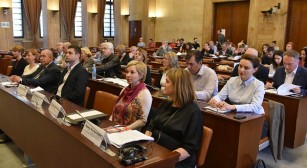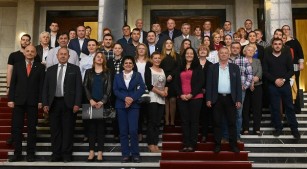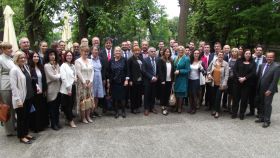 The position of persons with mental disorders dwelling in closed institutions was the focus topic of this week's two-day Belgrade conference of the South-East European National Torture Prevention Mechanisms (NPMs) Network attended by Prof. Zoran Pavlovic, SJD, the Provincial Protector of Citizens - Ombudsman and his advisors.
The position of persons with mental disorders dwelling in closed institutions was the focus topic of this week's two-day Belgrade conference of the South-East European National Torture Prevention Mechanisms (NPMs) Network attended by Prof. Zoran Pavlovic, SJD, the Provincial Protector of Citizens - Ombudsman and his advisors.
According to Milos Jankovic, the Acting Serbian Ombudsman, who addressed the participants on behalf of the host institution at the conference opening, persons with mental disorders dwelling in closed institutions are in a difficult and disadvantageous position, representing thus one of the most vulnerable groups of Serbian citizens.
The most frequent problems in proceedings concerning these citizens are lack of training with the police in face-to-face handling of these persons, as well as the issue of initiating and running proceedings involving criminal offenders with no reasoning ability. Additionally, there are many people with mental disorders in prisons with inadequate dwelling conditions for this population. Their mandatory psychiatric treatment is yet another unresolved issue.
Similarly, the issue of obtaining a voluntary consent of persons with mental disorders to be institutionalized is still one of the major ethical challenges in the proceedings run by relevant authorities, along with the proper and legitimate implementation of patients' physical restraint and isolation measures that, despite being justified and aimed at their best interest, are often carried out arbitrarely and even in irregular ways. This situation calls for a dialogue with the relevant authorities resulting in a different approach to persons with mental disorders.
The presenters on handling persons with mental disorders deprived of their freedom by the police, in prisons and during implementation of security measures, as well as on handling them in psychiatric hospitals and welfare institutions with limited public access, were ombudspersons and coordinators of the South-East European NPMs, along with psychiatry and forensic medicine experts.
Source: www.zastitnik.rs
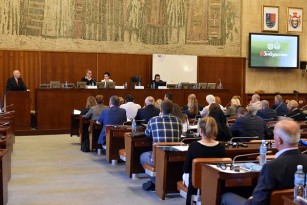 "Today, the right to good governance implies that authorities - public services and other public authority establishments - are not merely instruments of governenace, but, above all, a citizen's service. In this respect, the right to good governance represents a democratic value, a standard in public authorities' operation. Good governance does not imply solely finding and abiding by the best legal solutions, but also standards of running proceedings maximally observant of citizens' dignity and integrity."
"Today, the right to good governance implies that authorities - public services and other public authority establishments - are not merely instruments of governenace, but, above all, a citizen's service. In this respect, the right to good governance represents a democratic value, a standard in public authorities' operation. Good governance does not imply solely finding and abiding by the best legal solutions, but also standards of running proceedings maximally observant of citizens' dignity and integrity."
These were the words of Prof. Zоrаn Pаvlоvić, SJD, the Provincial Protector of Citizens - Ombudsman, at the yesterday's opening of the human rights training for Vojvodina Assembly MPs organized by the Provincial Protector of Citizens - Ombudsman (PPCO) institution with the support of an international partner. Along with the good governance principles public services are bound to observe, Prof. Pavlović also stated the reasons why the existence of ombud institutions was important for the executive and legislative authorities, pointing out the following:
„Monitoring the exercise of these principles grants citizens a certain level and quality of public services' operation, aka executive authorities. In its work so far, the PPCO institution has witnessed examples of failure to adhere to these principles, which are automatically examples of public authorities' poor performance. Therefore, in this respect PPCO recommendations provide for correction of such performance, conducive to changing the malfunctioning patterns of the authorities' work."
The opening and introductory part of the yesterday's training were attended by István Pásztor, the President of the Vojvodina Assembly as well, along with Ivan Stijepović, one of its Vice-Presidents. Besides international standards and national human rights regulations relevant for their work, around forty MPs learnt more about the PPCO mandate and its jurisdiction and way of running proceedings. Discussing examples from the PPCO practice over the years was another way MPs were able to understand its potentials and contribution to the human rights upholding and promotion in the Autonomous Province of Vojvodina.
Alongside Prof. Pavlović, the National Rights Protection Deputy Ombudswoman Eva Vukašinović, as well as the PPCO advisors in children's rights, gender equality and general human rights affairs, the representatives of the international partner delivered presetations concerning human tights law, their history , structure and sources, as well as specific aspects of human rights protection of members of the Roma community.
The concluding discussion justified the aim of this training - introducing Vojvodina MPs to the human rights principles and the importance of their upholding and promotion in the context of executive authorities' operation. The MPs expressed a wish for such trainings, focusing on even more specific human rights issues, to be organized on a regular basis. Besides their content with the acquired knowledge and insights into the institutional human rights protection specifically, the MPs expressed their readiness to discuss human rights issues more actively in the future and to raise issues significant for human rights promotion, both at the local self-government level and in the Vojvodina Assembly.
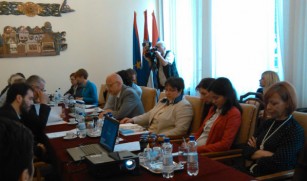 The biggest problem in accessing welfare system services and exercising the rights of its beneficiaries is population ageing on one side, as well as progressing poverty of socially vulnerable groups on the other, especially in rural areas. This was one of the issues discussed at today's regional ombud meeting in Novi Sad. The meeting of representatives of human rights protector's institutions from Bosnia and Herzegovina, Croatia, Hungary and Romania with the Provincial Protector of Citizens - Ombudsman (PPCO), the organizer and host of the event, was held in the light of the 2017 being declared a Welfare and Intergenerational Collaboration Year in the Autonomous Province of Vojvodina.
The biggest problem in accessing welfare system services and exercising the rights of its beneficiaries is population ageing on one side, as well as progressing poverty of socially vulnerable groups on the other, especially in rural areas. This was one of the issues discussed at today's regional ombud meeting in Novi Sad. The meeting of representatives of human rights protector's institutions from Bosnia and Herzegovina, Croatia, Hungary and Romania with the Provincial Protector of Citizens - Ombudsman (PPCO), the organizer and host of the event, was held in the light of the 2017 being declared a Welfare and Intergenerational Collaboration Year in the Autonomous Province of Vojvodina.
The meeting was held as one of the PPCO Collegium sessions, the aim of which is to discuss current human rights affairs with representatives of peer institutions, experts and research-involved public striving for improvement of conditions for citizens' human rights exercise and protection. Special attention during this meeting has been paid to advancing accessibility of welfare, healthcare and other forms of institutional protection for the elderly, people with disabilities, as well as other welfare beneficiaries.
After the introductory address of Prof. Zoran Pavlovic, SJD, the Provincial Protector of Citizens - Ombudsman, the representatives of the guest ombud institutions from the region also presented the legal and institutional framework of their countries' welfare systems, as well as the issues the citizens of these countries addressing the ombud institutions had been facing. Along with PPCO Deputies Aniko Sirkova and Eva Vukasinovic, as well as PPCO associates involved in handling citizens' complaints, the participants of the meeting were Prof. Ljubinko Mitrovic, SJD, Ombudsman of Bosnia and Herzegovina, Prof. Erzsebet Sandor-Szalay, SJD, National Minority Rights Ombudswoman and a Deputy Commissioner for Fundamental Rights of the Republic of Hungary and Timea Csikos, SJD, a Legal Adviser with the same Institution. Romania was represented by Roxana Marcu, the Coordinator of the Timisoara Regional Office of the Romanian Ombudsman, while the Croatian Ombudsman was represented by Teodora Matej, Human Rights Promotion, Cooperation and PR Advisor with the Institution.
Based on the attending ombud institutions' presentations, one of its conclusions was that problems concerning provision of welfare and healthcare services to the elderly, people with disabilities and other vulnerable social groups, as well as the general population, were common to all states in the region represented at today's meeting. Demography-related problems as a consequence of population ageing and emigration of the youth had also been considered, along with the limited capacities of welfare services and institutions to provide for adequate human rights protection of the elderly and people with disabilities. The need for paliative care is also ever more evident with such services, rural areas being particularly negatively affected in this respect.
It is expected that regular meetings such as this one, providing for experience-sharing among ombud institutions in the region, would contribute to more efficient processing of citizens' complaints in the field of welfare, as well as pension and disability insurance, requiring action of peer institutions from two or more neighboring countries. The following regional ombud meeting has been tentatively scheduled for the first week of April 2018, while the initiative of the PPCO regarding drafting a joint project of these institutions concerning their own and other independent human rights protection mechanisms' capacity-building and aimed at facilitating social inclusion of vulnerable groups has been considered welcome by all meeting participants.
The meeting ended with a visit to the Novi Sad Home for the Elderly, where the guests had an opportunity to learn more about the organization, work and challenges of one of the biggest welfare institutions in the Autonomous Province of Vojvodina.
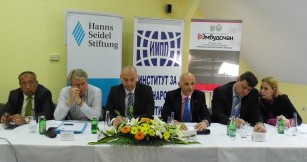 Migrations as security challenges along the Western Balkans Route was the topic of a three-day international conference that was finished in Palic yesterday. The intent of its organizers - the International Politics and Economy Institute from Belgrade, the Hanns Seidel Foundation in Serbia and Montenegro and the Provincial Protector of Citizens - Ombudsman (PPCO) - was that its participants consider legal, security and social aspects of challenges the migration crisis posed before the relevant authorities, as well as the human rights protection institutions, the media and the academic community in the countries of the region.
Migrations as security challenges along the Western Balkans Route was the topic of a three-day international conference that was finished in Palic yesterday. The intent of its organizers - the International Politics and Economy Institute from Belgrade, the Hanns Seidel Foundation in Serbia and Montenegro and the Provincial Protector of Citizens - Ombudsman (PPCO) - was that its participants consider legal, security and social aspects of challenges the migration crisis posed before the relevant authorities, as well as the human rights protection institutions, the media and the academic community in the countries of the region.
The Conference brought together several tens of representatives of various stakeholders. Over thirty presenters at the conference came from the academia, human rights institutions, international agencies, national migration authorities and the media from Bulgaria, Macedonia, Republic of Srpska, Romania, Russia, Hungary and Serbia. Besides the organizers, the contributors to the Conference were also representatives of the Ministry for Labour, Employment, Veterans and Welfare of the Serbian Government, the Commisariat for Refugees and Migration of the same Government, as well as the representatives of the judiciary with experience in handling cases involving migrants, refugees and asylum-seekers in Serbia. The authors of conference papers presented at the Conference came from the Russian Academy of Sciences from Moscow, Faculty of Law of Timisoara University in Romania, the Neofit Rilski South-West University from Bulgaria, the S. Climent of Ohrid University from Macedonia, University of Pecs in Hungary, Faculties of Philology, Law and Security of the Belgrade University in Serbia, the Military Academy, Crime and Police Academy, the Economics Academy, Criminology and Sociology Institute, European Studies Institute, the Business High School from Serbia, along with the Vojvodina Radio and Television Public Service and the PPCO.
The Conference topics tackled the causes of migrations, their legal challenges and solutions to them, socio-economical consequences, security and human rights in the context of migration, migrants' personal status and safety, media reporting about the migration crisis, as well as reactions to it. The Conference formulated conclusions and recommendations for relevant authorities, as well as other stakeholders (the academia, civil society organizations and the media), to serve as guidelines for their future actions concerning issues of migration, refugees and asylum-seekers.
Recommendations to the governments in the region, the funding agencies and the international community focus primarily on improvement of cooperation in Western Balkans. Besides a more intensive dialogue and cooperation with the neighboring and other Balkans countries affected by the migration crisis, within the framework of its relations with the EU Serbia should devise and implement an effective collaboration in harmonizing activities and measures aimed at resolution of the migration crisis, simultaneously also observing its Constitution and focusing on providing a more efficient response to the migration crisis. Furthermore, countries along the Balkans route should provide a more efficient access to the asylum-seeking proceedings for the migrants and full observation of the principles prohibiting forced exile or coercion to stay in the country.
Due to the duration and scope of the migration crisis, aka nowadays longer period the refugees and illegal migrants are staying in Serbia, the increasing burden on the national and the budget of the local self-governments, prevention of disturbing the public order and peace, as well as the need to provide legal and other proscribed assistance to Serbian citizens, refugees and illegal migrants, it is necessary to analyze the existing legal framework in Serbia in order to consider possible changes or amendments to the existing legislation, or adoption of new policies and regulations.
Mid-term recommendations to the aforementioned actors are that it is necessary to pay more attention to prevention of secondary movement of migrants, harmonize the border related legislation, check the status of the so-called safe third countries, as well as provide space, forums and platforms for inclusion of interested parties in these processes.
In the long run, it would be beneficial to resort to the practice of integrated border management. Migrants and refugees should be considered as persons potentially contribution to the local economy, and not only as a social burden. These persons need to be consulted, as much as possible and in coordination with the local self-government authorities, concerning their integration in local communities. All social actors should invest maximum efforts to make sure the migration crisis does not become a stumbling block along the way of the EU integration processes.
These recommendations need to be considered bearing in mind the needs and expectations of citizens of the countries along the migration route, as well as the fair and just need for providing humanitarian and other aid to the migrants, in line with the objective possibilities.
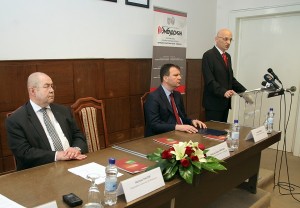 The first Provincial Protector of Citizens - Ombudsman (PPCO) Honorary Collegium Meeting was held at the Vojvodina Assembly today. Its purpose was to introduce the institution's 2016 Annual Report, as well as its activity plan for the current and fortcoming years, to the expert and wider public.
The first Provincial Protector of Citizens - Ombudsman (PPCO) Honorary Collegium Meeting was held at the Vojvodina Assembly today. Its purpose was to introduce the institution's 2016 Annual Report, as well as its activity plan for the current and fortcoming years, to the expert and wider public.
The first to addres the guests was Prof. Zoran Pavlovic, the Provincial Ombudsman. Reminding them of the fact that, at the time of its establishment 15 years ago, the institution he had been running since December 2016, was the first of its kind in the Republic of Serbia, Prof. Pavlovic thanked the attendees for their support to the institution so far and expressed his belief that the collaboration will continue in the future, primarily bearing in mind that one of its aims in the forthcoming six years would be to contribute to increasing citizens' trust in institutions as much as possible.
Greeting the attendees of the PPCO Honorary Collegium Meeting, the President of the APV Assembly Istvan Pasztor reminded them that it was the Provincial Parliament was the first to establish an ombudsman institution in the Republic of Serbia back in 2002, which is a fact to take pride in.
'We had dedided to do it believing firmly in the principles and foundations of a modern, contemporary society, rule of law and regulations, as well as due to the need to protect the dignity of each and every individual. These are the two pillars of any responsible and developed society and state. The PPCO is a corrective instance warning us about situations in which there is a gap between the law and justice and providing support to any individual feeling that the society has wronged him or her,' said President Pasztor.
Pasztor pointed out that the PPCO is a long-term institution, the need for which will pertain as long as there is discord between the law and justice, so it is in the best interest of all that it be a strong one, with developed capacities, in order to face challenges along its path as easily as possible. He also said that, just like before, the Vojvodina Assembly will fully support the work of the PPCO institution in order to strengthen it and promote its work.
The Provincial Government President Igor Mirovic said that the rapidly accelerating times we are living in keep facing us with ever new challenges in the human rights field, so the support of the Provincial Government to the PPCO is therefore incontestable, unequivocal and to be considered on two plains.
'The first is providing all conditions for an independent and self-contained work, which is the substantial definition of PPCO the role and existence. Therefore, right at the beginning, I feel the need to emphasize that no one from us inteds to interfere in its work or to influence it in any way. It is a firm and consequent position, not only mine, but of the entire Provincial government. The second plain of our support is resolute insisting on legality in the work of all insittutions constituting provincial executive authorities. No one who is a part of provincial administration in any capacity will be in a position to count on any kind of tolerance concerning violation of anyone's human rights. Moreover, being a part of this administration means - and will continue to imply - a double mandatory commitment not to do it under any circumstances,' said Mirovic.
The president of the Provincial Government pointed out that, by its nature, the role of an ombudsan institution is very important in human rights exercise, while Prof. Pavlovic's presentation on the activities planned is reasurring, implying that he will fulfill the mission entrusted to him in the best possible way.
'Conclusions, recommendation, solutions the PPCO will formulate during its work represent not only a part of reports to be discussed at Assembly sessions, but a part of a, I dare say, joint mission to support all the comments, conclusions and guidelines in order to be another stone in the building of a house of an even higher level of human rights observation in our country and here in Vojvodina,' said Mirovic at the end of his address, wishin the PPCO institution fruitful work in the future.
Speaking about the PPCO plans, Prof. Pavlovic stated that the institution intends to continue and develop its existing activities, as well as to introduce some new ones, primarily in the field of institutional representatives' education in human rights and by conducting research studies. Several cooperation agreements with research and educational institutions have been signed with this aim so far, the first number of the PPCO Bulletin has been published, while the institution's Ethical Code is about to be adopted in order to pose as an example to all ombud institutions in our country. In 2017, a PPCO library will also be established, serving as a research and study reference center both for the expert public and law and humanities students.
'Every ombudsman's basic activity is to act upon citizens' complaints,' said Prof. Pavlovic. 'However,' he pointed out, 'an ombudsman's purpose is not to criticize for the purpose of being critical. A protector of citiznes points to the ways to improve the ways in which we could all work together in a bette, more efficient and responsible way. In the insterest of all citizens, in the interest of all of us.'
The guests at the event expressed their support to the work of the PPCO institution, emphasizing the need for its more intesive engagement in citizens', as well as public authority bearers' education in human rights, along with the need to advance the link between the human rights scientific and research sphere and ombuds institutions' practice in Serbia and the region by means of doing research projects and experience-sharing.
The PPCO Honorary Collegium Meeting Свечана is a unique meeting and networking opportunity among the most relevant human rights actors in the institutional human rights protection field in the APV and Serbia. Besides representatives of the Vojvodina Assembly and Provincial Government, the event was attended by several tens of representatives of national and provincial institutions, including the ombuds, the judiciary and executive authorities, scientific and research institutions, international organizations, such as OSCE Mission to Serbia and UN Resident Coordinator's Office in Serbia, as well as national professional organizations dealing with human rights exercise, protection and development.
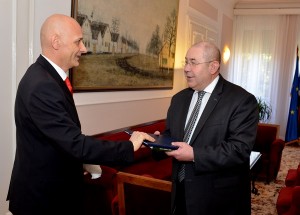 The Provincial Protector of Citizens - Ombudsman, Prof. Zoran Pavlovic, SJD, submitted the institution's 2016 Annual Report to Istvan Pasztor, the President of the Assembly of the Autonomous Province of Vojvodina (APV).
The Provincial Protector of Citizens - Ombudsman, Prof. Zoran Pavlovic, SJD, submitted the institution's 2016 Annual Report to Istvan Pasztor, the President of the Assembly of the Autonomous Province of Vojvodina (APV).
Pointing out that, according to the procedure and so-far good practice, the Annual Report of the Provincial Protector of Citizens - Ombudsman (PPCO) will be discussed at the next APV Assembly plenary session, President Pasztor expressed his contentedness with the work of PPCO, the institution dealing very responsibly with complex issues of human rights protection for the benefit of citizens of Vojvodina over the last 15 years.
President Pasztor and Ombudsman Pavlovic, as well as the General Secretary of the APV Assembly Nikola Banjac, discussed the future collaboration significance and prospects concerning numerous and versatile PPCO activities planned for 2017, aimed at further affirmation of this institution as a notable, professional and relevant aid to citizens wishing to exercise and protect their human rights.
According to the Provincial Assembly Decision on the Provincial Protector of Citizens - Ombudsman, the PPCO is bound to produce an annual report presenting its activities in the previous year, information on established malfunctions in the work of executive authorities, a general evaluation of the executive authorities' performance from the regulation implementation perspective, as well as suggestions for improvement of citizens' position before the executive authorities. The Report also contains data on the No. and structure of citizens' complaints, along with special parts concerning national minority and children's rights and gender equality.
Source: Assembly of the Autonomous Province of Vojvodina
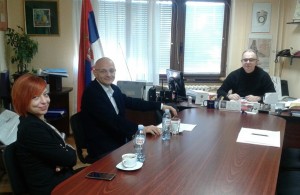 During today's visit of Prof. Zoran Pavlović, SJD, the Provincial Protector of Citizens - Ombudsman (PPCO), to the Novi Sad County Prison it has been concluded that the rights of convicts and detainees are observed and respected, while the professional services within the Prison are acting according to the regulations. The visit has been implemented along the lines of the PPCO institution jurisdiction to observe and monitor implementation of internetaional contracts, standards and regulations in the field of human rights and, based on the information collected, to recommend measures to improved the state of human rights concerning their protection and development. Special attention has been paid to the position of detained minors, as well as general accomodation conditions, security and availability of healthcare services and no irregularities have been registered in this respect.
During today's visit of Prof. Zoran Pavlović, SJD, the Provincial Protector of Citizens - Ombudsman (PPCO), to the Novi Sad County Prison it has been concluded that the rights of convicts and detainees are observed and respected, while the professional services within the Prison are acting according to the regulations. The visit has been implemented along the lines of the PPCO institution jurisdiction to observe and monitor implementation of internetaional contracts, standards and regulations in the field of human rights and, based on the information collected, to recommend measures to improved the state of human rights concerning their protection and development. Special attention has been paid to the position of detained minors, as well as general accomodation conditions, security and availability of healthcare services and no irregularities have been registered in this respect.
Compared to the earlier period, the accomodation facilities are somewhat less crowded, providing in itself improved conditions for implementation of prison sanctions, aka imprisonment. The current number of imprisoned individuals provides also for improved hygiene, better treatment conditions, as well as easier implementation of security measures. Despite all this, the current number of staff, especially in the Security Service, has been deemed insufficient, especially in the light of the prison's aspirations to raise the standards of its work.
Architectural and structural barriers have been a decades-long challenge from the prisoners' accomodation viewpoint. However, certain improvements have been made by improving the condition of sanitary facilites, contributing thus to a higher general level of hygiene in the prison. On the other hand, certain hygiene-related challenges of the Novi Sad County Prison are a reflection of the convicts' inadequate attitude and behavior concerning general conditions in this institution. It is most evident in their perception of the need to maintain and keep their material environment and sanitary facilites in good condition, as well as in the way they are taking care about their own hygiene and health.
No irregularities in the institutions proceedings and work have been registered concerning observation of convicts' rights, their discrimination on any grounds or application of enforcement measures for security purposes, while the staff treat the convicts and detainees correctly and in the proscribed manner. Absence of discrimination and proper treatment of convicts is indicated also by availability of legal remedies to them, as well as their uninterrupted correspondence, participation in treatments, conditions of accomodation and the way security measures are being implemented, along with the fact that all notifications posted all over the facility have been translated into languages in official use within the Novi Sad City limits.
Healthcare services provided to detainees and convicts is also satisfactory, whereas in emergency situations their waiting-time for healthcare services is on average far shorter than that of the rest of the population. The challenges in this respect of the County Prison operation, as stated before, is the attitude of the convicts concerning their own health, characteriyed by neglect and engaging in risky behaviour, primarily forbidden, unsanitary tatooing exposing them to a very high risk of infectuous diseases.
Some points of improvement relate to occupational engagement of convicts. Most of them are in the closed section of the prison, so the number of those involved in occupational activities is disproportionally small. The reason for it is, on one hand, of formal and legal nature due to regulations failing to provide for occupational engagement to be a mandatory part of convicts' reeducation. Onthe other hand, the availability of work within the prison is fairly limited. Despite periodical occupational engagement of a smaller number of individuals, the current state of affairs is such that they do not get training opportunities for potentially more marketable jobs. This is particularly important because such a situation complicates the implementation of social reintegration acitivites with convicts upon their leaving the prison, along with diminishing their chances of employment.
There are certain limitations concerning the treatment contents as well, namely the resocialization process itself. Despite availability of various corrective programs in the Novi Sad County Prison, their theoretical base and effectiveness requires a higher level of compliance with the current scientific and expert standards. The fact that around 70 percent of current convicts are imprisoned for proprietary fellonies indicates that more needs to be done to adapt the treatment to suit the needs of this particular population. There are, however, certain individual steps forward in this prison that might serve as an example of good practice to other similar institutions when it comes to specialized training of staff in treatment of domestic violence perpetrators. Implementation of such treatment increases the hope of victims of this type of violence that its perpetrators will be ready to face challenges of life upon leaving the prison and that their behavior will not be a threat to anyone anymore.
Besides the current level of the convicts' human rights exercise reached, in the light of future efforts of relevant institutions focusing on crime prevention and elimination it is also necessary to consider measures providing for raising the level of convicts' awareness and their responsibility towards the community. High costs of implementation of criminal penalty measures, along with a considerable recidivism rate in Serbia, pose a question of effectiveness of the existing penal system, aka treatment of convicts. Prisons should definitely not be a place of enforcement or coercion, yet it is necessary to reconsider their role in the process of resocialization of persons who have done their time in them in a way that would, on one hand, grant safety to all citizens, and enable ex-convicts and crime perpetrators to become functional members of society, on the other. Only an actual social reintegration of persons who have served their time in prison and prevention of re-comitting crimes will represent the highest possible level of observance of human rights and protection of ex-perpetrators of crime, their family members, as well as all citizens of Vojvodina and Serbia.
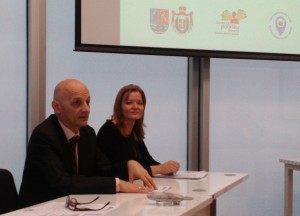 The Provincial Protector of Citizens - Ombudsman, Prof. Zoran Pavlović, SJD, addressed the participants of the 'Trauma and Healing - Treatment of Psychological Consequences for Women and Girls with the Experience of Domestic and Sexual Violence' held at the Rectorate building of the Novi Sad University yesterday.
The Provincial Protector of Citizens - Ombudsman, Prof. Zoran Pavlović, SJD, addressed the participants of the 'Trauma and Healing - Treatment of Psychological Consequences for Women and Girls with the Experience of Domestic and Sexual Violence' held at the Rectorate building of the Novi Sad University yesterday.
The conference was one of the activities of the Provincial Secreatariat for Healthcare within the frame of the 'Stop - Care - Cure - A Stronger Institutional Response to gender-based violence in the AP of Vojvodina' project. The event was a chance to present the results of the first year of project implementation, as well as for experience-sharing among the representatives of institutions and civil society organizations in AP of Vojvodina concerning treatment of psychological consequences of trauma with women and girls with experience of gender-based violence.
Besides the conference host, Ivanka Savić, MD, Deputy Provincial Secretary for Healthcare and Coordinator of the 'Stop - Care - Cure' project, and Prof. Pavlović, in the capacity of the head of the institution coordinating the Life Without Violence Network for 11 years back, some of the conference presenters were also Gordana Stevanović, Children's Rights and Gender Equality Deputy to the Serbian Ombudsman, Svetlana Ivanović Kovačević, MD, PhD, Assistant Professor at the Psychiatry Clinic of the Clinical Center of Vojvodina, Prof. Vesna Petrović, PhD, President of the Serbian Integrative Psychotherapy Association, representatives of civil society organizations providing support to women in situations of violence Biljana Stepanov and Radoslava Aralica, Milena Golubski, MD, from the Novi Sad Primary Healthcare Center, as well as Milica Džino, the Coordinator of the Children's and Youth Center with the Novi Sad Welfare Center and Nada Padejski, MD, the Coordinator of the Safehouse with the latter Welfare Center.
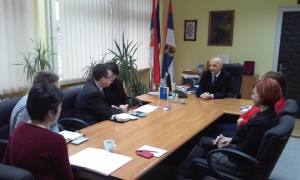 Prof. dr Zoran Pavlović, the Provincial Protector fo Ctitzens - Ombudsman, has met with Mr. Claude Cahn, Adviser with the Office of the United Nations Resident Coordinator in Novi Sad today.
Prof. dr Zoran Pavlović, the Provincial Protector fo Ctitzens - Ombudsman, has met with Mr. Claude Cahn, Adviser with the Office of the United Nations Resident Coordinator in Novi Sad today.
Referring to the previously announced possibilities of cooperation concerning project implementetion in the filed of human rights exercise and protection of people with mental disabilities, people deprived of liberty and residents of closed institution, as well as projects dealing with Roma housing and education, the main topic on the agenda has been agreeing on the future steps aimed at providing the necessary conditions for implementation of some of the Provincial Ombudsman institution activities in 2017 that the UN office in Serbia is interested in supporting.
Besides Prof. Pavlović and Mr. Cahn, the meeting has been attended by Mr. Milan Marković from the Human Rgihts Department of the Serbian UN Office, as well as Deputy Provincial Ombudswomen Aniko Širkova and Eva Vukašinović.
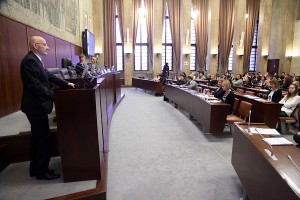 The 11th consecutive annual conference of the Life Without Violence Network of institutions in Autonomous Province of Vojvodina (APV), organized by the Provincial Protector of Citizens - Ombudsman (PPCO) institution, has been held in the APV Assembly today. This year's conference dealt with the responsibilities and obligations of relevant institutions in the light of the Istanbul Convention, aka the Council of Europe Convention on preventing and combating violence against women and domestic violence , as well as the changes introduced by the recently adopted Domestic Violence Prevention Law in Serbia.
The 11th consecutive annual conference of the Life Without Violence Network of institutions in Autonomous Province of Vojvodina (APV), organized by the Provincial Protector of Citizens - Ombudsman (PPCO) institution, has been held in the APV Assembly today. This year's conference dealt with the responsibilities and obligations of relevant institutions in the light of the Istanbul Convention, aka the Council of Europe Convention on preventing and combating violence against women and domestic violence , as well as the changes introduced by the recently adopted Domestic Violence Prevention Law in Serbia.
In his opening address, expressing his pleasure that the event brought together representatives of all institutional systems on all level of government, expert public and the academia, as well as civil society oganizations, Prof. Zoran Pavlović, the Provincial Protector of Citizens - Ombudsman, stressed the aim of establishing and the basis of operation of the Life Without Violence Network, coordinated by the institution to the helm of which he recently got appointed:
'My wish today and here is that jointly we do all in order to restore citizens' trust in institutions. In order to show all the socially oppressed and victimized that they are not alone and that, no matter how prosaic it may sound, the state takes care about the interest of its citizens. We would also like to send a clear message to the perpetrators of violence that it will not be tolerated. That we will not turn our heads the other way and that we do have a clear strategy of no tolerance, penalization, but a mandatory perpetrators' treatment as well. It is only by a systemic, wholistic approach that it is possible to make a more significant move in protection of women, as well as other victims of violence. It is only by reaching high standards in the work of all links in the proceedings chain that it will be possible to achieve the projected goals. The chain is as strong as its weakest link, and violence prevention cannot allow for such weaknesses.'
Besides Prof. Pavlović, the PPCO, other speakers addressing the attendees of the introductory plenary session were the following: Snežana Sedlar, the Vice-President of the APV Assembly, Slobodan Josimović, Deputy Prosecutor with the Novi Sad Senior Public Prosecutor's Office, Tanja Ignjatović from the Autonomous Women's Center and Prof. Tihomir Vejnović, MD, PhD, the Manager of the Gyneacology and Obstetrics Clinic of the Vojvodina Clinical Center. The conference attendants also had a chance to participate in one of the four panel discussions on various topics. The panel on domestic violence as a security issue was run by Gordana Stevanović, Deputy to the Serbian Ombudsman, and Maja Bjeloš from the Belgrade Center for Security Policy. Specific risks concerning women from ethnic minority communities, with a special focus on Roma women, were the topic of the panel run by Goran Bašić, PhD, the Director of the Humanities Institute from Belgrade and Jelena Jovanović, an APV Assembly MP. Keynote speakers of the sexual violence prevention panel were Biljana Delić from the Provincial Secretariat for Healthcare and Nikola Petković, PhD, from the Novi Sad County Prison. Media reporting about domestic and violence against women was the topic of the panel run by Zorica Mršević, PhD, the Advisor in the Humanities Institute in Belgrade and Duška Bajić, a journalist and one of the authors of the 'While It's Not Too Late' series aired currently on the regional Vojvodina TV and concerning small arms and violence, including domestic violence.
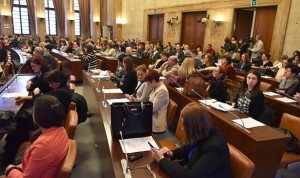 The conference brought together around 120 representatives of the judiciary (i.e. courts and public prosecutor's offices), police, welfare centers, healthcare institutions, local self-government units, national minority councils, as well as the local ombudsmen, experts and the academia. After presentations of conclusions from the four panel discussions, Veljko Delibašić, PhD, Associate from the Belgrade Univeristy, talked about harmonization of the Serbian criminal legislation with the istanbul Convention. With a presentation on the Genovese syndrome, Prof. Pavlović, the PPCO, closed the conference discussing the issue of responsibility of every single person affected by violence, especially its eye- and other witnesses, to do something in order to prevent it.
The conference brought together around 120 representatives of the judiciary (i.e. courts and public prosecutor's offices), police, welfare centers, healthcare institutions, local self-government units, national minority councils, as well as the local ombudsmen, experts and the academia. After presentations of conclusions from the four panel discussions, Veljko Delibašić, PhD, Associate from the Belgrade Univeristy, talked about harmonization of the Serbian criminal legislation with the istanbul Convention. With a presentation on the Genovese syndrome, Prof. Pavlović, the PPCO, closed the conference discussing the issue of responsibility of every single person affected by violence, especially its eye- and other witnesses, to do something in order to prevent it.
Just like in the previous years, the conclusions of this year's Life Without Violence Network annual conference will be sent to relevant institutions in order to point out current issues and problems concerning taking action in cases of domestic and gender-based violence. the conclusions will also tackle the development possibilities of the formal and legislative framework, as well as the work of the institutions aimed at prevention and elimination of violence.






